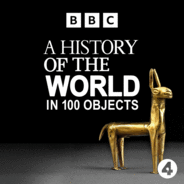This week Neil MacGregor, the director of the British Museum, has chosen some of the great status symbols of the world around 700 years ago - objects with quite surprising links across the globe. Today he is with one of the most familiar objects at the museum; a board game, found in the Outer Hebrides but probably made in Norway - the Lewis Chessmen. They are carved out of ivory and many of the figures are hugely detailed and wonderfully expressive. They take us to the world of Northern Europe at a time when Norway ruled parts of Scotland and Neil describes the medieval world of the chessmen and explains how the game evolved. The historian Miri Rubin considers the genesis of the pieces and the novelist Martin Amis celebrates the metaphorical power of the game of chess.Producer: Anthony Denselow

Kultur & Gesellschaft
A History of the World in 100 Objects Folgen
Director of the British Museum, Neil MacGregor, narrates 100 programmes that retell humanity's history through the objects we have made.
Folgen von A History of the World in 100 Objects
101 Folgen
-
Folge vom 28.06.2010Lewis Chessmen
-
Folge vom 25.06.2010Kilwa pot sherdsThis week Neil MacGregor has been looking at objects from Japan, Britain, Java and central Europe, exploring the great arcs of trade that connected Africa, Europe and Asia a thousand years ago. Today he sifts through a selection of broken pots, found on a beach in East Africa, to see what they might tell us. Smashed pottery, it seems, can be astonishingly durable and can offer powerful historical insights. These ceramic bits - in a variety of glazes and decorations - were found on the island of Kilwa Kisiwani off Tanzania. Neil uses the fragments to tell the story of a string of thriving communities along the East African coast with links across the Indian Ocean and beyond. The historian Bertram Mapunda and the writer Abdulrazak Gurnah describe the significance of these broken pieces and help piece together the great cross-cultural mix that produced the Swahili culture and language. Producer: Anthony Denselow
-
Folge vom 24.06.2010Borobudur Buddha headA history of the World in one hundred objects arrives on the Indonesian island of Java. This is the series that offers a new history of humanity through the individual objects that time has left behind. These items are all in the British Museum and the series is presented by the museum's director, Neil MacGregor. Throughout this week Neil is tracing the great arcs of trade linking Asia, Europe and Africa around a thousand years ago. Today he has chosen a stone head of the Buddha that comes from one of the world's greatest monuments, the giant Buddhist stupa of Borobudur. Borobudur rises from a volcanic plain in the middle of Java, built from one and a half million blocks of stone and devised as an architectural aid to spiritual practice. Neil MacGregor reports from the various levels of Borobudur and describes the trade routes that brought Buddhism to South East Asia. He also explores the impact the discovery of Borobodur had on the founder of Singapore, Sir Stamford Raffles and his ideas about the importance of Javanese civilization. The anthropologist Nigel Barley celebrates the life and work of Stamford Raffles while the writer and Buddhist teacher Stephen Batchelor sums up the spiritual significance of BorobudurProducer: Anthony Denselow
-
Folge vom 23.06.2010Japanese bronze mirrorThe history of humanity as told through one hundred objects from the British Museum in London. This week Neil MacGregor is looking at objects from Tanzania, Britain, Java and central Europe, exploring the great arcs of trade that connected Africa, Europe and Asia around a thousand years ago. Today he arrives in Japan with an object that offers a dramatic twist on the week's theme. This small mirror from the bottom of a sacred pond comes from a time when the Japanese suddenly cut themselves off from the outside world and stopped all official contact with China, a country it had frequently borrowed ideas from. Neil tells the story of the Heian period of Japanese history, a moment of great cultural awakening in Japan, especially in literature. The object is a small mirror that was found at the bottom of a sacred pond. The writer Ian Buruma and the archaeologist Harada Masayuki help describe the Japan of this time.Producer: Anthony Denselow
